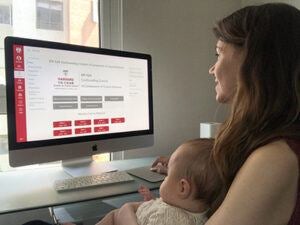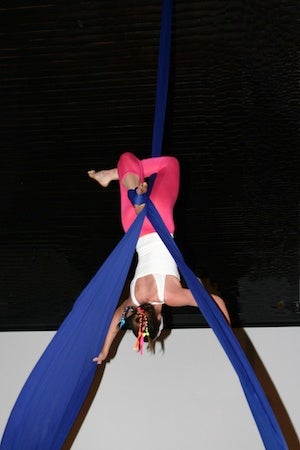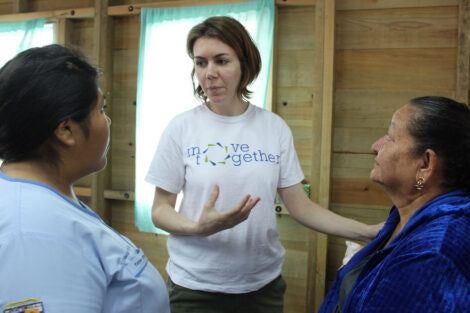March 15, 2021 – A physical therapist specializing in chronic pain, Gabriela Borin Castillo has done volunteer work with Paralympic athletes and helped build a rehabilitation clinic in Guatemala. The native Brazilian is now living in Chile and working toward her MPH in Epidemiology at Harvard T.H. Chan School of Public Health—often with her baby Maria in her lap.
I found out I was pregnant in February 2020, we moved to Chile in a month later so I could start working on a practicum project here, and then the pandemic started. So for my whole pregnancy and through my baby’s first few months, I’ve been home. The MPH in Epidemiology is normally a combination of online and on-campus learning, and I was able to take on-campus classes during the first year of my MPH in 2019, but for the summer 2020 semester when I was supposed to be back on campus, my courses were online due to the pandemic. For my practicum I conducted a survey that was supposed to involve in-person interviews with patients, but those also had to be moved online.

Here in Chile, we don’t have support. We didn’t have a chance to meet new friends before the pandemic started. My husband, Miguel, has some old friends from high school and college, but we have not been able to see them in person. We also haven’t been able to see any relatives—all my family are in Brazil, and Miguel’s family lives in other cities in Chile. Our families only met our newborn daughter Maria by video call. It’s just me, my daughter, and my husband. It’s been pretty intense.
It helps a lot to talk with other students who also have young children. I participate in the group Parents@HarvardChan. The most helpful advice I’ve gotten is: Just do what you can, you don’t have to be perfect, don’t compare yourself with other people, and enjoy the time with your daughter and your family, because this time isn’t coming back.
I became interested in physical therapy because I always liked to play sports, but got some injuries along the way and was treated by a physical therapist. I was very intrigued by how she worked—she didn’t need medicine or anything else to treat people, she just used exercise and her own hands. I was motivated by the idea of using physical therapy to help people have a better quality of life even if they had an injury or disability.
Seeing the struggles and limitations of my patients made me want to go further to improve their lives. I went to the University of Massachusetts Amherst to earn a PhD in kinesiology, and while I was there I had the opportunity to take some classes in public health. I saw that the tools of epidemiology could help me develop research that could have a population-level impact on patients dealing with some kind of disability. I decided to apply to Harvard Chan School, in part, because professors here have projects in Brazil and other countries in South America, and I always wanted to come back here to do research.
I’ve worked on several projects in Latin America during my time at Harvard Chan. In January 2020, before the pandemic started, I took a field course in Chile with Thomas Bossert, where we spent a month learning about the health care system. This past January, I took a field course in Brazil with Marcia Castro—online—focused on the COVID-19 pandemic in that country. Now I’m working with Rifat Atun as a research assistant on a project to study issues regarding patients’ difficulty in accessing cancer treatment in Colombia, Chile, Argentina, and Brazil.
If you have chronic pain, it can affect your whole life. That’s why I’m interested in it. It can have consequences for sleep, mental health, relationships, social skills, and work efficiency. It affects a high percentage of the population. And it can be very difficult to treat. In many cases, patients become dependent on opioids because of chronic pain. Here in Latin America we don’t have many studies looking at the connection between chronic pain and opioid use. If we do more research, I think we could prevent a scenario similar to what happened in the U.S.—the opioid epidemic—from happening here.
I’m working on a practicum project here in Chile on chronic pain. Working with my practicum mentor, Michael Barnett, I conducted online surveys of patients both in Chile and in the U.S. over the past few months about their access to health care and to pharmacological and non-pharmacological treatment during the COVID-19 pandemic, and how their pain levels have changed depending on the kind of health care access they’ve had. The goal is to compare differences between the two countries in how people’s pain is being managed during the pandemic.
I’m president of the Brazilian Students Association at Harvard Chan. Through the group, we connect about our courses or research projects, hear speakers, and share our experiences or difficulties.

I really like to do circus arts—like aerial silks, which is when you perform aerial acrobatics while hanging from a fabric. I started doing it when I was an undergraduate and continued after that, but when I got pregnant I had to stop. Now I like to do yoga at home.
Photos courtesy Gabriela Borin Castillo
